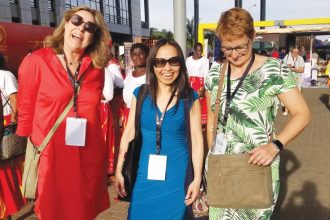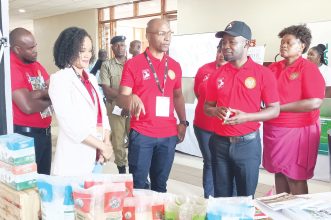Ending poverty step by step
Rhoda Lamusi had been receiving social cash transfers until authorities decided that she was no longer eligible for the monthly payouts to the poorest of the poor.
Machinga District Social Welfare Office struck her name off the list of suitable recipients, meaning she was well-off and had better left the social protection initiative to households in abject poverty.
Today, Lamusi of Makina Village in Traditional Authority Nsanama in the district owns five goats and a grocery shop.
She belongs to a village savings and loans (VSL) group that guarantees her low-interest loans for business growth and dire needs.
The woman is one of the Malawians who graduated from abject poverty with support from the Financial Access for Rural Markets, Smallholders and Enterprise Programme (Farmse).

She opened her backyard shop in 2021 when she received K112 000 and five goats from the programme.
“When the goats multiplied, I passed the same number on to my neighbour and the rest were mine to enjoy,” she says.
Lamusi is optimistic to see her trip of goats expand, giving her more meat, manure, milk and money.
In 2022, she received a second instalment of K118 000 from Farmse.
She explains: “I ploughed the money into my shop and increased the VSL shares.
“This support has been life-changing as my earnings and livelihood are improving despite the tough economic times. My family can afford nutritious food and other basic needs without depending on well-wishers or the government.”
Lamusi’s family is among 7 000 households supported by the Farmse initiative to enhance nutrition and livelihoods in Machinga, Balaka and Dedza districts.
The programme implemented the programme in partnership with the Ministry of Finance and Economic Affairs, targeted 8 030 ultra-poor households.
It started in April 2021 and phased out last month.
Minister of Finance Simplex Chithyola says the programme needs to be expanded to more districts as the target households are rising from abject poverty to self-reliance.
“The programme has made a huge impact on the people’s lives and upscaling it to more districts across the country will help people move out of poverty,” he says.
The Norwegian Government financed the pilot phase through the International Funding for Agriculture Development (Ifad), the United Nations agency financing vehicle for community development.
Ifad country representative Bernadette Mukonyora is upbeat about the transformative partnership with the Government of Malawi.
To her, good nutrition is central to people’s effective contribution to economic development.
“You can have all the development plans you want and you can give people all the money you want, but not much will be achieved if you don’t take care of nutrition which helps people to better participate in the economy,” she says.
Mukonyora further urges the government and other partners to upscale the programme to other districts nationwide.
Farmse national coordinator
Dixon Ngwende said although various players are excited with the outcomes, they have yet to commit their support to reach more districts.





